The 19th quarterly conference of the China Labour Economics Scholars Forum focusing on the theme of "Income Distribution and Social Security" was held online on 11th December 2022. The conference is organised by the Council of the China Labour Economics Scholars Forum and organised by the School of Public Finance and Taxation of ZUEL and IIDPF, with technical support from the journals China Economics Quarterly, Management World, The Journal of World Economy, Economic Science, Studies in Labour Economics, China Economic Studies, China Journal of Economics and China & World Economy. Around 300 faculty members and students from Peking University, Tsinghua University, Renmin University of China, Nanjing University, ZUEL, Shanghai University of Finance and Economics, Southwest University of Finance and Economics, Northeast University of Finance and Economics, Wuhan University, Huazhong University of Science and Technology, Xi'an Jiaotong University, Jilin University, Shandong University, Lanzhou University, Zhengzhou University, Capital University of Economics and Business, Beijing University of Technology and Business, Guangzhou University of Foreign Studies, University of New South Wales and other universities attended the online conference.
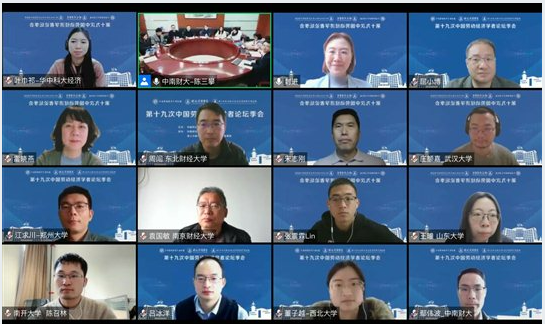
  The conference was chaired by Professor Xue Gang, Deputy Dean of School of Public Finance and Taxation, ZUEL. Prof. Zhang Kezhong, Dean of School of Public Finance and Taxation, ZUEL and Prof. Lei Xiaoyan, Chairman of the Board of the National Development Research Institute of Peking University and China Labour Economics Scholars Forum, delivered speeches respectively.
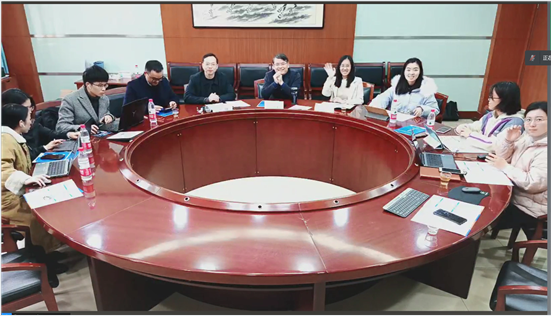
  Prof. Zhang Kezhong firstly expressed his gratitude to the organizer, the Board of Directors of the China Labour Economics Scholars Forum as well as his warm welcome to all the participants and the audience, and expressed his heartfelt thanks on behalf of the conference organizers, the School of Public Finance and Taxation and IIDPF, for the trust of the China Labour Economics Scholars Forum. In his speech, Professor Zhang Kezhong pointed out that labour is the source of all things, that labour creates wealth and beauty, and that public policy is closely related to every worker. To this end, we meet online around the theme of income distribution and social security and are proud to host the 19th quarterly meeting of the China Labour Economics Scholars Forum. "How can we make the market bigger while at the same time dividing up the distribution and achieving common prosperity?" is the focal point of the interdisciplinary research we face. Professor Zhang Kezhong briefly introduced the overall development of the finance discipline in the School of Public Finance and Taxation, invited talents from home and abroad to join us, and wished the conference a great success.
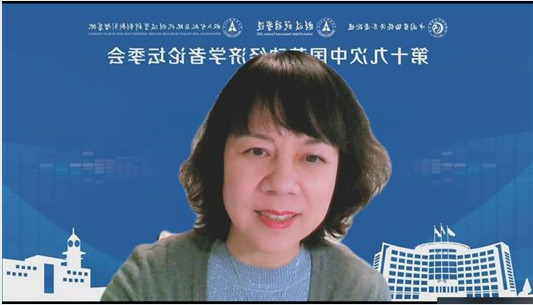
  Prof. Lei Xiaoyan introduced the background and mission of the establishment of the China Labour Economics Scholars Forum, and expressed his heartfelt thanks to the organizer of the conference, the School of Public Finance and Taxation of ZUEL, the secretary-general of the China Labour Economics Scholars Forum, Mr. Fu Hongqiao, for the coordination of all parties, and the guidance and support of the governing bodies and journals such as The Journal of World Economy, China Journal of Economics and Studies in Labour Economics. Professor Lei Xiaoyan expressed the high appreciation for the research strength of the School of Public Finance and Taxation of ZUEL and IIDPF, and regarded it also an important reason why the theme of this quarterly conference was "Income Distribution and Social Security". In conclusion, Prof. Lei Xiaoyan expressed the welcome and thanks to all participants and wished the conference a great success!
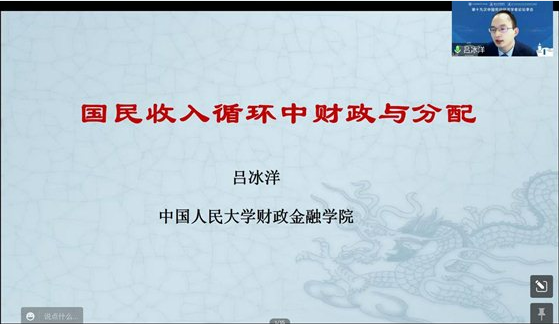
  The opening ceremony was followed by keynote speeches by Professor Lü Bingyang from the School of Finance and Economics of Renmin University of China and Professor Feng Jin from the School of Economics of Fudan University.
  Professor Lü Bingyang delivered a keynote speech entitled Finance and Distribution in the National Income Circulation. Professor Lü started from the representative view that the essence of finance is national distribution, and pointed out that the economic meaning of equality of distribution is equality of utility. He also described the cycle of national income, and suggested that the government can regulate the production, redistribution, consumption and accumulation stages of the cycle by means of the tax system, social security and public expenditure to ensure the equality of utility of residents. In addition, social security has a much greater regulatory role than income tax, and should be implemented nationally as soon as possible. At the same time, taxation should be embedded in society to a greater extent and the capacity of government transfer expenditure to equalise basic public services should be enhanced.
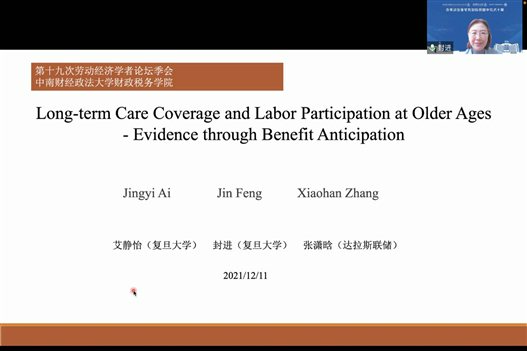
  Professor Feng Jin delivered a keynote speech entitled "Long-term Care Coverage and Labour Participation at Older Ages: Evidence Through Benefit Anticipation". She constructed a DID model based on data from the 2011, 2013, 2015 and 2018 CHARLS surveys to analyse the impact of long-term care insurance on labour participation at older ages from a life-cycle perspective. The study found that the implementation of long-term care insurance policies reduces the labour force participation rate of participants by 5.4% and household income by 10.2%, but has no significant impact on consumption. This crowding-out effect is more pronounced in the disabled, low-income and female groups. At the same time, long-term care insurance can improve the health of participants and reduce their healthcare expenditure in future years.
  The conference then moved on to a sub-forum discussion session. The conference received about 160 high quality submissions, and 33 high quality papers were selected for the presentation session based on factors such as quality and relevance of the chosen topic. The session on "Public Policy and Income Distribution" was moderated by Song Zhigang from the editorial board of The Journal of World Economy. Dr Wang Tong from Shandong University presented a paper entitled "Labour Market Outcomes of Minimum Wage Changes: A Behavioral Perspective", and Dr Jia Tiantian from Nanjing University affirmed the importance and significance of the paper's research. Dr Jia Tiantian from Nanjing University affirmed the importance and significance of the paper and commented on the applicability of the model applied in this paper in China as well as the research prospects. Dr Zhuang Ejia from Wuhan University presented a paper entitled "Intergenerational Top Income and Wealth Mobility in Taiwan: A Nonparametric and Family-wise Approach". Dr Wang Tong from Shandong University affirmed the academic and policy value of the article and offered different insights on the differences in wealth transmission trends among different groups, the logic behind the economic principles and the short-term fluctuations of the sample data. Dr Jia Tiantian from Nanjing University presented on the topic of "Partial Privatization, Producer Service and Skilled-Unskilled Wage Inequality in Developing Countries". "Dr Zhuang E’jia from Wuhan University confirmed the contribution of the paper and commented on the connotations of the concepts, important assumptions, and the models and refinements of production and bargaining.
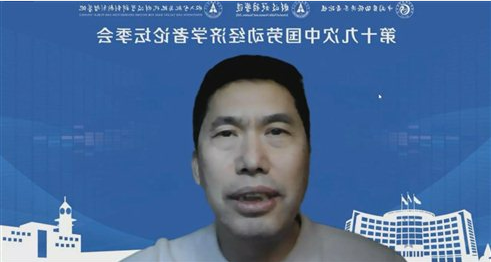
  The sub-forum on "Pension Insurance and Social Security" was chaired by Mr. Qu Xiaobo from the Editorial Board of Studies in Labour Economics. Dr Han Shuyu from Jilin University gave a presentation entitled "Research on the impact of new rural insurance on the labour supply of the middle-aged and elderly in rural areas". Dr Leng Xiyuan from China Agricultural University commented on the paper in terms of the overall structure of the article, the timing of the selection of the sample, and the selection of the target population, while Dr Qu Xiaobo gave suggestions for revision in terms of the textual requirements for submission. Dr Wu Jing from ZUEL reported on the topic of "Does basic social pension insurance narrow the financial asset allocation gap between urban and rural households? -Empirical Evidence from CHFS". Dr Han Shuyu commented on the paper from the perspectives of topic selection, selection of conditional variables and robustness testing. Dr Leng Xiyuan presented a paper entitled "A Study on the Impact of Basic Pension Insurance on Medical Consumption and Chronic Disease Intervention among Rural Older People". Dr Wu Jing reviewed the paper from the perspectives of theoretical framework, research hypothesis, sample selection, heterogeneity test and policy implications.
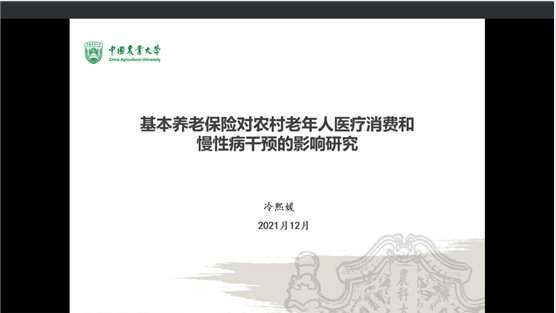
  The sub-forum on Population Ageing Services and Elderly Services" was chaired by Dr Feng Jin from the School of Economics, Fudan University. Dr Gao Peng from Shanghai University of Finance and Economics presented on the topic of "Does the integration of health care improve the health and well-being of the elderly? and Dr Guo Qing from Renmin University of China commented on the selection of indicators, argumentation of research questions, empirical analysis and impact mechanisms. Dr Gao Peng commented on the definition of concept, theoretical basis and logical arrangement. Dr Guo Qing gave a presentation entitled "Digital Economy, Ageing Workforce and Firm Productivity - A Study Based on Employer-Employee Matching Data", and Mr. Dong Ziyue from Northwestern University made comments on data sampling and robustness testing.
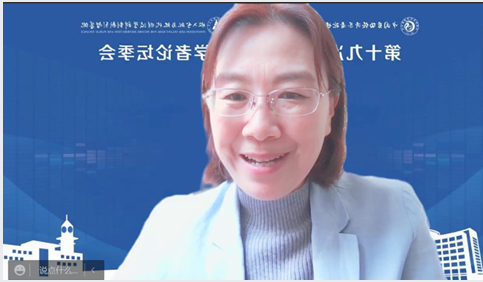
  The sub-forum on "Income Inequality" was chaired by Dr Shi Xinzheng from the editorial board of The Economic Journal. Dr Jiang Quchuan from Zhengzhou University reported on the topic of "Does income inequality inhibit or promote individual giving? Dr Chen Jiawei from Renmin University of China affirmed the academic value and practical significance of the paper and gave comments on the paper in terms of mechanism analysis, robustness test, Gini coefficient and mediating effect. Dr Huang Jiawen from Hefei University of Technology reported on the topic of "Research on the Impact of the Internet on Intergenerational Income Mobility", and Dr Guo Haixia from Lanzhou University commented on the paper in terms of the selection and refinement of control and instrumental variables. Dr Guo Haixia presented on the topic of 'Measurement and Change Decomposition of the Relative Poverty Index in Urban and Rural China', and Dr Jiang Qichuan commented on the definition of criteria, data measurement methods and the applicability of the data fitting function at different times. Dr Chen Jiawei reported on the topic of "Is the implementation of the compulsory education law conducive to reducing educational inequality? --An Analysis from the Perspective of Educational Crowding", and Dr Huang Jiawen commented on the definition of the concept and its theoretical basis, and the comparative analysis of different impacts.
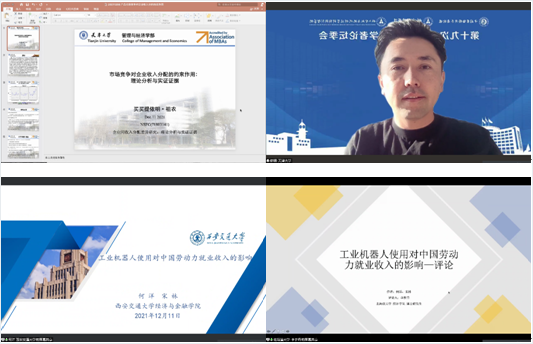
  The sub-forum on "Income Distribution and Labour Market" was chaired by Dr Sun Wenkai of the School of Economics, Renmin University of China. Dr MemeTiming Zunong of Tianjin University gave a presentation entitled "The Constraining Effect of Market Competition on Corporate Income Distribution" and Dr Kui Zhao of Huazhong University of Science and Technology commented on the paper in terms of the novelty of the topic and the selection of variables. Dr He Yang from Xi'an Jiaotong University presented on 'The impact of industrial robot use on labour force employment income in China', and Dr Li Mengdan from Hokkaido University commented on the paper from the perspectives of sample selection, measurement of gender income gap, and robustness testing. Dr Li Mengdan from Hokkaido University gave a presentation entitled "Trends in China wage inequality : The lower-tail widened more than the upper-tail", and Dr Babaiteiming Zunong from Tianjin University reviewed the paper from the perspectives of sample selection, gender income gap measurement and robustness testing. The paper was reviewed from the perspectives of representativeness of the sample, institutional background and economic mechanism. Dr Zhao Kui from Huazhong University of Science and Technology gave a presentation entitled 'Levelling the Playing Field: 200 years of Affirmative Action and Human Capital Accumulation in China'. Dr He Yang presented questions and insights on the adequacy and representativeness of the sample, the channels of basic education facilities, demonstration effects and robustness tests.
  The sub-forum on "Income Distribution and the 'Three Rural Issues'" was moderated by Dr Hongqiao Fu from the School of Public Health, Peking University. The topic of the presentation by Lai Shihai from Guangdong University of Foreign Studies was "Divide or Dividend: Can Migrant Workers Use the Internet to Increase Their Income? and Dr Zhang Zhenlin from Wuhan University commented on the data selection, hypothesis fragmentation and instrumental variables selection. Dr Liu Lei from Beijing University of Business and Economics gave a presentation entitled "How can migrant workers return to their hometowns to start their own businesses to promote common prosperity in rural areas? and Dr Li Fanghua from the University of New South Wales, Australia, commented on the selection of variables, sample selection and control trial setting. Dr Li Fanghua shared her presentation on Heterogeneous impacts of cash transfers on employment and earnings in developing regions, while Lai Shihai commented on data underestimation and sample selection. Dr Zhang Zhenlin's presentation was entitled "Have income flows between urban and rural residents alleviated income inequality? and Dr Liu Lei commented on core explanatory variables, endogeneity analysis, etc.
  The sub-forum on -Social Insurance Collection" was chaired by Dr Luo Chuliang from the School of Labour and Human Resources of Renmin University of China. Dr Bing Zhang from Southwest University of Finance and Economics reported on the topic of "Who benefits from social security fee reductions? -- The Fate and Welfare Distribution Effects of Social Security Fee Reductions'. Dr He Fan from Huazhong University of Science and Technology commented on the variable measurement, base selection and variable identification treatment involved in the article. Dr Huang Yongying from Huazhong University of Science and Technology reported on the topic of "Asymmetry of Local Fiscal Adjustment: Empirical Evidence Based on Fee Rate Reduction in China", and Dr Zhang Bing gave comments on the omitted variables, identification treatment, mechanism of action and sample selection issues. Dr Du Pengcheng from Capital University of Economics and Business reported on the topic of 'Social Insurance Collection System Reform and Enterprises' Labour Income Share', with Dr Huang Yongying giving comments on variable control, sample size, sample selection and mechanism testing. Dr He Fan reported on the topic of "Who bears the corporate tax burden: the income distribution effect of tax collection". Dr Du Pengcheng commented on indicators and samples, impact mechanism, data measurement, multi-dimensional robustness test and heterogeneity test.
  The sub-forum on "Medical Insurance and Social Security" was chaired by Dr Weibo Yan from the School of Public Finance and Taxation of ZUEL. Dr Huang Jialin from Peking University presented a paper entitled 'The impact of supplementary medical insurance on residents' consumption: evidence from major medical insurance for urban and rural residents', while Dr Feng Chen from Shanghai University of Finance and Economics reviewed the paper in terms of similarities and differences with other studies such as the impact of medical insurance on consumption, the way consumption is broken down, the analysis of heterogeneity and the data structure of the benchmark results. Dr Ye Zunqi from Huazhong University of Science and Technology reported on the topic of "Does the loss of health insurance affect short-term health and labour supply? --An empirical study based on the reform of urban workers' basic medical insurance'. Dr Zhou Chuang from Northeast University of Finance and Economics commented on the paper from the perspectives of the selection of control variables, the selection criteria of the sample and the robustness test. Dr Zhou Bong gave a presentation entitled 'Urban-rural health insurance co-ordination and the family-oriented migration of migrant workers'. Dr Huang Jialin reviewed the paper from the perspectives of the use of policy evaluation methods, placebo tests and economic mechanisms, and Dr Yan Weibo suggested that the time trend of the treatment and control groups could be considered. Dr Feng Chen gave a presentation entitled 'Quality Improvement of Primary Care and Improvement of Doctor-Patient Relationship' and Dr Ye Scarf Qi commented on the paper from the perspectives of whether the selection of sample data was affected by the reform, interpretation of doctors' trust scores and placebo tests.
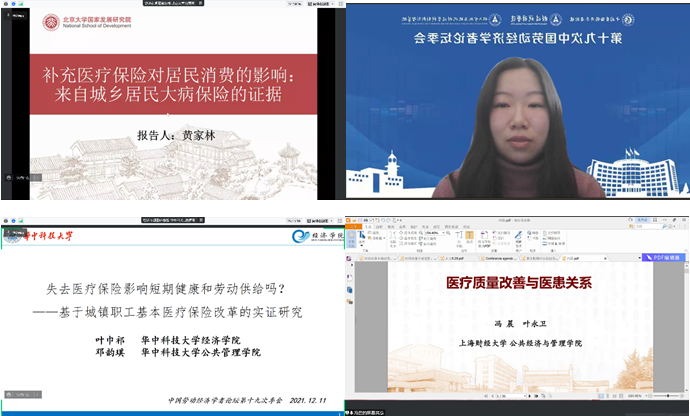
  The sub-forum on "Other Social Security Policies" was chaired by Dr Chen Sanpan from the School of Public Finance and Taxation, ZUEL. Dr Zhao Ying from ZUEL presented on the topic of "How Public Policy Improves Equity of Opportunity - Evidence from Health Poverty Alleviation in China", while Dr Zhao Meijie from Central University of Finance and Economics commented on the representativeness of the sample data and the introduction. Li Yuxiao from ZUEL gave a presentation entitled 'Intergenerational Impact of Delayed Retirement on Children's Fertility - An Empirical Analysis Based on CHARLS', and Dr Zhang Haiyan from Renmin University of China commented on data processing, sample selection and other issues. Dr Zhang Haiyan shared her presentation titled 'The Long-Term Impact of Maternity Leave Extension on Mothers' Income', while Dr Zhao Ying commented on the sample selection, theoretical analysis framework and covariate jumping. Dr Meijie Zhao's presentation was entitled "Family Childcare Subsidy Policies, Public Education Expenditure and Economic Growth", and Yuxiao Li commented on the analysis of the heterogeneity problem and the validation of the actual data.
  At this point, the 19th quarterly Conference of the China Labour Economics Scholars Forum came to a successful conclusion. The conference provided a platform for high-quality academic display and exchange for scholars who have long been engaged in the research of labour economics in China. The exchange of wisdom among nearly 300 experts, scholars, teachers and students from major universities, scientific research institutions, journals and magazines across China provided new ideas and theoretical approaches for exploring how to further deepen the reform in the fields of population ageing, labour market, social insurance, medical insurance, pension services and " It provided new ideas and theoretical methods for exploring how to further deepen the reform of China's population aging, Labour market, social insurance, medical insurance, pension services, "three rural areas" and other fields, and strongly promoted the innovative research in the field of Labour economics in China.
  The next quarterly meeting is expected to be held in March 2022 in Guangzhou, Guangdong, hosted by South China Agricultural University, please stay tuned!
